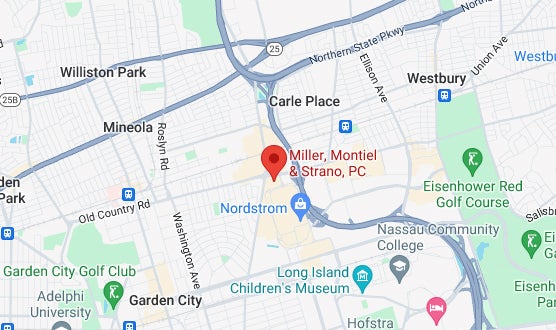Suffolk County Personal Injury Attorney
Request Consultation
Suffolk County Personal Injury Lawyer

Everyone has the right to live their lives without fear that someone else’s irresponsible behavior will cause them harm. Unfortunately, not everyone respects this right. Personal injury law is a practice area focused on ensuring that the victims of negligent conduct are compensated for the financial and personal losses they and their families suffer.
Miller, Montiel & Strano, P.C. is dedicated to serving personal injury victims throughout Suffolk County. When you retain our firm, you have a trusted, knowledgeable legal ally that will advocate for you from the beginning to the end of your case.
What Is Personal Injury Law?
If someone acts in a careless, reckless, or intentional manner that causes physical, mental, or emotional injury to another person, the victim of that behavior can seek compensation for the losses that he or she incurs. This is known broadly as personal injury law, and it covers a number of harms committed by one party against another. Some examples of lawsuits that fall under the personal injury umbrella include:
- Car, truck, and motorcycle accidents
- Bicycle and pedestrian accidents
- Pedestrian knock-downs
- Sidewalk accidents
- Construction site accidents
- Slip, trip, and fall and other premises liability cases
- Uber and Lyft accidents
- Bus, train, and public transportation accidents
- Wrongful death
- Burn injuries
The point of filing a personal injury lawsuit is to win a monetary award that is known as damages. Damages are usually intended to compensate the victim for economic losses (for which the dollar amount can be readily calculated) as well as for non-economic losses (where the value is more subjective, e.g. pain and suffering). In some rare cases, the amount of money awarded can punish the wrongful party. These are known as punitive damages.
The Elements of a Suffolk County Personal Injury Lawsuit
The law obligates individuals, businesses, and other entities to conduct themselves as a reasonably prudent person would. The failure to act with this degree of reasonable care forms the basis of personal injury claims. Intentional acts and omissions (failing to do something that one should have) can also lead to a personal injury lawsuit.
New York requires the victim to prove four specific elements to win a personal injury case. They are:
Duty of care. This term refers to the obligation of the at-fault party (the defendant in a lawsuit) to not harm the victim (plaintiff). As an example, when you drive on the state’s roads, you owe a duty to motorists, pedestrians, and others to safely operate your vehicle and obey traffic laws.
Breach. A breach is simply a violation of the duty of care. It is the result of negligence, intentional acts, and/or omissions. This element is typically one of the most hotly contested issues in a personal injury lawsuit.
Causation. The plaintiff must show, first, that the defendant’s breach was a cause-in-fact of the plaintiff’s injury. This means that, but for the defendant’s conduct, the injury would not have occurred. Additionally, the plaintiff must prove proximate cause, which means the defendant could have reasonably foreseen that his or her conduct would cause injury to the plaintiff.
Damages. Finally, the plaintiff must establish the nature and amount of damages as described above. Damages can compensate a plaintiff for past, present, and future losses. Expert witnesses are often used to project a reasonable sum of money to cover future damages.
The Types of Damages You May Seek
Depending on the nature of your personal injury, you might be able to seek a number of different damages from the at-fault party. These are a few examples:
- Medical bills, including hospitalization, ambulance, surgery, lab work, adaptive medical equipment, prescription medications, and other costs
- Physical therapy and rehabilitation
- In-home personal care for victims who have suffered permanent injuries
- Lost income
- Lost future income (sometimes called lost earning capacity)
- Emotional distress and mental anguish
- Pain and suffering
- Punitive damages, which may be awarded in cases of extreme misconduct
- Wrongful death damages if the victim dies
Is A Trial Necessary?
Most personal injury claims are resolved between the plaintiff’s attorney and the defendant’s lawyer and insurance company. This can avoid the time and expense of a lengthy trial. However, it is strongly advised that you do not talk with the insurance company on your own. Insurance companies are for-profit businesses, so the more claims they underpay or deny, the more money they make. Insurers are also known to use a number of dishonest tactics against victims, such as intentionally asking them leading or deceptive questions.
You should understand that once your case settles (or goes to trial if settlement negotiations are not successful), you will not get another chance to ask for more damages. That means if you fail to anticipate the nature of future losses stemming from your personal injury, you will have to cover these costs yourself. Our attorneys have a reliable network of expert witnesses who help make projections for these future damages so you can be fairly covered for your injuries.
Contact Our Suffolk County Personal Injury Attorney
Our attorneys not only understand New York personal injury law, we know what it takes to build a winning case. Your lawsuit will be handled by one of our partners, not managed by a paralegal. We are proactive and responsive to the needs and concerns of our clients and we zealously represent their best interests. Reach out to Miller, Montiel & Strano, P.C. today to schedule your initial consultation.



